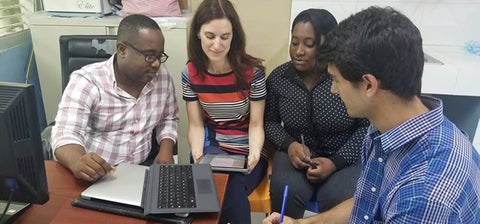
Pharmacy student volunteers with Pharmaciens Sans Frontières on Haiti mission
Rx2020 Olivier Millette is passionate about global health. Back in high school he had joined an aid mission to the Dominican where he helped to build schools in the community.
“I liked that experience more than I imagined. And as a pharmacy student, I was looking for an opportunity to use my pharmacy knowledge in a similar capacity. I already had an interest in Pharmaciens Sans Frontières – that’s Pharmacists Without Borders – so when the opportunity came up for this Haiti trip, I was excited to participate,” explains Olivier.
Olivier was the perfect candidate: he had health care knowledge, an interest in aid work, and French was his first language. Haiti’s history as a French colony meant that French or Haitian Creole – a language derived from French and the influences of other European and West African languages – are the most commonly spoken languages, and the Pharmaciens Sans Frontières team was based out of Montreal and primarily French speaking.
After an interview with the team, Olivier was signed on for the mission. Working with Anthony Miller, Waterloo Pharmacy’s Experiential Coordinator for Co-op, Olivier secured a co-op job where he’d be able to take off two weeks for the trip.
Haiti has in recent years been rocked by a combination of natural disasters and political instability. Anti-government riots and a resurgence of gang violence were topics covered in Olivier’s interview. The Pharmaciens Sans Frontières team wanted to ensure that Olivier knew what to expect on the ground, and the potential dangers were enough to dissuade other students from Quebec universities from participating.
“I was a bit apprehensive, but I did lots of research, listened to the news, and got a sense of realistically what to expect. The Pharmaciens Sans Frontières folks were supportive and reassuring, and at no point in my trip was I especially afraid for my safety,” he reflects.
Olivier and the team were based at a hospital in Port-Au-Prince, Haiti’s capital. The team consisted of one pharmacist, two physicians, and Olivier, and stayed in the hospital’s guest quarters, travelling outside of it for meals and on the one day off a week they received.

“What first struck me about landing there was the complete lack of infrastructure. Most places had no electricity, roads flooded in the rain, and many people lived in a state of extreme poverty, sleeping on the streets. Often caregivers of patients at the hospital would sleep in the open-air courtyard in the middle of the building.”
Olivier had done one hospital co-op work term prior to arriving in Haiti, and while that experience prepared him, the Haitian system was also quite different, both in terms of how it ran and in the types of patients they treated. The hospital focused on trauma and with the instability in the country, many of the patients Olivier saw were victims of beatings and gunshots related to gang violence, or other violent altercations or accidents.
“I think it was good that I was on my third work term – by then I’d developed a bit more confidence and independence. My classes and knowledge also helped me feel prepared to contribute.”
flooded roads in Haitian streets
His days began conducting rounds with the other pharmacist volunteer and the physicians. Haitian pharmacists typically serve a dispensing role and aren’t involved in rounds. But the pharmacist Olivier volunteered with was an experienced hospital pharmacist, and together they helped demonstrate the benefits of incorporating a pharmacist in various hospital processes.

The hospital where Olivier volunteered
“The Haitian medical staff were very receptive to the contributions a pharmacist could make,” he remembers, “so we ended up writing a guide to explain the places in the hospital system where a pharmacists knowledge could be very beneficial, beyond traditional dispensing roles.”
Effective aid work leaves information or systems in place that can have a positive impact well after the volunteers themselves are gone. With that in mind, Olivier collaborated on another guidance document for the hospital, focused on antibiotic stewardship.
“They have a very different approach to antibiotic use there,” he explains. “Whenever someone is admitted they’re typically given broad spectrum antibiotics regardless of their injury or disease state.”
The process of developing the guide had its own challenges. The hospital relies on aid for many of medications, and so often the best drug for a particular situation is simply not available.

Olivier and team members at the hospital collaborating
“We ended up having to take out about 50% of the medications we’d recommended because of the realities of what drugs were reliably in their inventory. We tweaked the guide so that it would make the best use of frequently available resources.”
While Olivier sees himself practicing in a community environment after graduation, he knows that global health will also always be an interest, and he hopes to go on more aid missions, perhaps with Pharmaciens Sans Frontières.
“You learn so much from these types of experiences, from seeing how pharmacy is done in other parts of the world. I’d encourage every pharmacy student to do their research, reach out to organizations and make these opportunities for themselves.”